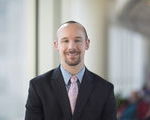Teacher of the Year award for Travis McKenzie, M.D. — showing how to be a surgeon
Travis McKenzie, M.D. (S ’09, S ’12), Division of Breast, Endocrine, Metabolic, and GI Surgery, Department of Surgery at Mayo Clinic in Rochester, received a Teacher of the Year Award from Mayo Clinic School of Medicine — voted on by the medical students.
Like his father and grandfather before him, Dr. McKenzie works with his hands. His métier is surgery; theirs was cabinetmaking. He may use his hands, but he says the technical aspects of surgery are only one aspect of medicine. “Being a surgeon is about caring for your patient. Any time a patient is wheeled into the OR, I try to be present. I hold their hand and reassure them I’m going to give them the best care that I can. Patients appreciate it, and it helps to put them at ease. I talk to my medical students, residents and fellows about why I do this. It’s important to help them learn the humanistic aspects of medicine.”
His approach seems to be effective. A student who nominated him for the award said, “Dr. McKenzie taught me in one short rotation how to be a better surgeon, doctor and teacher.”
Dr. McKenzie also received Teacher of the Year awards from the Mayo Fellows’ Association in 2015, 2016 and 2017, and from the General Surgery Residency Program in 2015, 2016 and 2017.
How do you know when you’ve done a good job teaching?
I can sense the excitement in the student. I can see their passion come out. I know I’ve done a good job when my teaching sets the environment for the student to engage with both me and the patient.
Residents and fellows are very focused on their objectives — in this case, to become fully trained surgeons. Medical students, on the other hand, are blank slates with very wide interests and a passion for learning all aspects of medicine. Our medical students are very driven and bright.
 What’s your teaching style?
What’s your teaching style?
My teaching style is collaborative. I pose questions, and we work through problems together to find the answers. I facilitate the process, but I do not simply offer answers. I make students work for it. I often learn as much from students as they learn from me. In the process, they raise questions I haven’t thought about.
What’s rewarding about teaching?
Teaching is one of the most gratifying things I do, and it will likely have the most significant long-term impact as trainees take what I’ve taught and use it to care for their own patients. If I’ve done a good job, students will ultimately become excellent teachers one day and teach students of their own.
Who were your teaching role models?
Having done my residency at Mayo, I have had fantastic surgical teachers in Dr. Geoff Thompson (S ’88, Division of Breast, Endocrine, Metabolic, and GI Surgery) in endocrine surgery and Dr. Michael Sarr (GI ’80) in metabolic and bariatric surgery. Dr. Thompson is a master of endocrine physiology and very gifted in passing along complex topics in a digestible manner. Dr. Sarr taught me the value of being a compassionate caregiver. He also taught me how to have patience in the OR. For surgical educators, patience is necessary to allow trainees to learn. Dr. Sarr allowed learners to struggle. I try to emulate that.
What do Teacher of the Year awards mean to you?
Teacher of the Year awards are very special. They demonstrate the impact you’re having on learners. This is not only gratifying but also very impactful for future generations and their patients.
What’s most challenging about teaching?
Being a good surgical educator requires that you relinquish an element of control in the OR. This is because the learner will not progress without some level of autonomy. This is very challenging for a surgeon. As the surgical consultant, you are directly responsible for what happens to the patient while they are asleep on your operating room table. You have to balance maximizing outcomes and safety with optimizing the learner’s education. The best surgeons strike a good balance with this. We have an obligation to train the future doctors of America at academic medical centers such as Mayo Clinic.
Key to education is creating an environment where learners can make mistakes. It’s the consultant’s responsibility to ensure safety. That ranges from making verbal suggestions during a procedure to stepping in and taking over control of the instruments.
You’re from Alaska. How did you end up at Mayo Clinic?
When I interviewed at Mayo Clinic for residency, I could tell education was paramount and a central focus of the program. I knew right then that this is where I had to be.
Toward the end of my residency, the possibility of returning to Mayo after my fellowship was raised. It was the perfect fit for me. Mayo felt like home. There’s no other place like this and no other surgical position that would allow me to do what I do here.